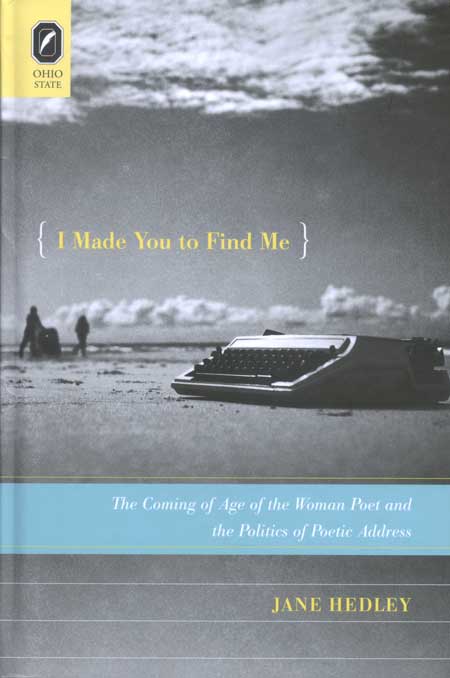I Made You to Find MeThe Coming of Age of the Woman Poet and the Politics of Poetic AddressJane Hedley |
 4/27/2009 Literary Criticism/Poetry 199 pp. 6x9  $44.95 cloth 978-0-8142-1101-4 Add cloth to shopping cart $14.95 CD 978-0-8142-9199-3 Add CD to shopping cart Shopping Cart Instructions Review/Change Shopping Cart & Check-out | |||
|
“Within the field of women’s poetry, this book significantly extends discussion of a defining concern, poetic authority, by attending to the construction of the ‘you’ in dynamic relation to the construction of the ‘I.’” —Elizabeth Bergmann Loizeaux, professor of English, University of Maryland “I Made You to Find Me is an ambitious book, yet it is also one that fulfills those ambitions, shedding light repeatedly on each poet in turn, on one poem after another and on the subtly emerging ‘generation’ outlined by these four poets, Anne Sexton, Adrienne Rich, Sylvia Plath, and Gwendolyn Brooks. Hedley brilliantly reads the work of each poet, frequently weaving in comparisons among them and with important male peers such as Robert Lowell, Ted Hughes, and Amiri Baraka.” —Holly A. Laird, professor of English, The University of Tulsa When Anne Sexton, Adrienne Rich, Sylvia Plath, and Gwendolyn Brooks began to write poetry during the 1940s and ’50s, each had to wonder whether she could be taken seriously as a poet while speaking in a woman’s voice. I Made You to Find Me, the last line of one of Sexton’s early poems, calls attention to how resourcefully the “I-you” relation had to be staged in order for this question to have an affirmative answer. Whereas Rich tried at first to speak to her own historical moment in the register of universality, Plath openly aspired to be “the Poetess of America.” For Brooks, womanhood and “blackness” were inextricable markers of poetic identity. Jane Hedley’s approach engages biographical, formal, and rhetorical analysis as means to explore each poet’s stated intentions, political stakes, and rhetorical strategies within their own historical context. Sexton’s aggressively social persona called attention to the power dynamics of intimate relationships; Plath’s poems lifted these relationships onto a different plane of reality, where their tragic potential could be more readily engaged. Rich’s poems bear witness to the enormous difficulty, notwithstanding the crucial importance, of reciprocity—of making “you” to find “we.” For Brooks, the crucial question has been whether she could presuppose an “American” audience without compromising her allegiance to “blackness.”
| ||||

